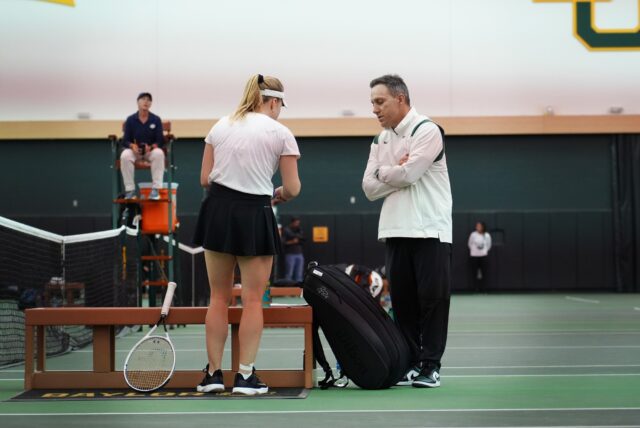By Dylan Fink | Sports Writer
Joey Scrivano sat down in the lobby of the Hurd Tennis Center and rubbed his hand across his temple.
“The head coaching position is being devalued more than ever in the history of all sports,” said Scrivano, who has spent 24 years at the helm of Baylor’s women’s tennis program.
“Everybody wants to lead, but then nobody wants the accountability,” Scrivano said. “It’s players, it’s administrators, it’s fans, it’s parents ... it’s everybody.”
Having coached at Baylor since 2003, the six-time Big 12 coach of the year is familiar with the highs and lows of the profession. The current extent of devaluation, he said, is something new.
“It’s the Jerry Jones Effect,” Scrivano said.
The long-tenured tennis coach believes this change in the way people view head coaches began with former Oakland Raiders head coach and owner Al Davis.
Davis, who played college football at Syracuse, served as the head coach for the Oakland Raiders from 1963-65. By 1972, he was the primary owner of the Raiders until he died in 2011. Under his reign, the Raiders saw immense success growing into a perennial playoff contender throughout the 1970s and 1980s and won three Super Bowl titles along the way.
“The difference there is that Al Davis was a hell of a coach,” Scrivano said. “He played, he became an owner, but he also had a deep understanding of what it took to build a team. Everybody started emulating what he was doing, but without any of the knowledge to do it.”
Scrivano sees fatigue rising among head coaches in the sports world, and is not afraid to credit overbearing administrators and players who are unwilling to let head coaches do their job.
“It started in pro sport and just spread everywhere, even as far down as Pop Warner football,” Scrivano said. “In our sport, with tennis, that’s one of the biggest challenges right now.”
The way high-level collegiate tennis functions has made coaching increasingly difficult.
The USTA junior tennis circuit is almost a requirement for players to compete at the Division I collegiate level. The circuit, which begins as young as age four, is fully focused on individual competition that puts both the player and the player’s parents in charge of their performance and success.
This is the cause, Scrivano said, of the lack of respect that collegiate head coaches receive in today’s game.
“In tennis, up until an athlete comes to college, the athlete is in charge,” Scrivano said. “Growing up, the parents are the ones paying; they’re the ones leading the program. The athlete gets to college and it’s the other way around. It’s a very different setup, and sometimes it’s frustratingly difficult to get somebody to buy in.”
Coaches are often surrounded by people who believe, loudly, that they could do the job better. Scrivano is no stranger to coaching in that sort of environment.
“I don’t think any college is immune to this,” Scrivano said. “When you have receipts of success, that helps a lot, but a lot of people still want their opinions heard on a lot of different things. That isn’t always needed.”
The perspective is shared by professional coaches, too. Longtime Miami Heat coach Erik Spoelstra has become known for his outspokenness in promoting coaches to ignore outside factors and trust the work they can control.
Boston Celtics head coach Joe Mazzulla, when asked about outside pressure on his job, famously made his feelings clear.
“We’re all going to be dead soon anyway,” Mazzulla said. “It won’t matter anymore, so with that [perspective] there’s zero pressure.”
Still, Scrivano has refused to give in. He’s fighting to bring value back to the head-coaching position.
“I still love what I’m doing,” Scrivano said. “It’s just very different than it used to be.”
Scrivano, who has won 11 Big 12 regular-season titles with the Bears, hopes to use his influence as a long-tenured head coach in the tennis world to push for an improvement in the treatment of head coaches across all sports.
“The programs that understand this devaluing of the head coaching position, the ones that really figure it out and let people like me do their job well, end up finding success,” Scrivano said. “You probably could start thinking in your mind over what pro sports do that, and I guarantee you they’re winning a lot.”



